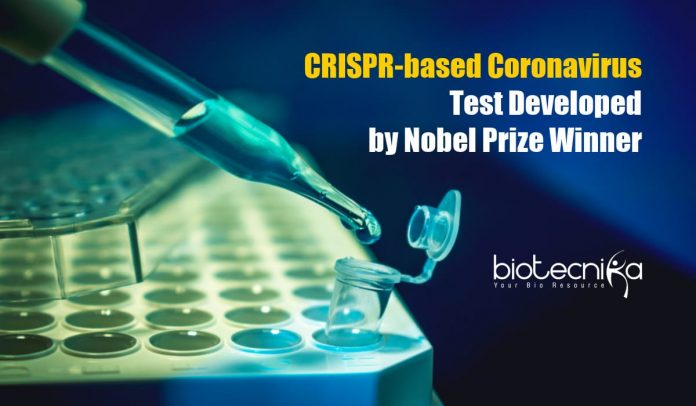CRISPR-based Coronavirus Test Developed by Nobel Prize Winner, Jennifer Doudna, capable of detecting the virus in just 5 minutes.
Using gene-editing technology and a modified mobile phone camera, a coronavirus test capable of detecting the virus in five minutes has been developed by a team of California-based researchers. The problem of under-testing in epidemic-stricken countries could be solved through this discovery.
The joint winner of this year’s Nobel Prize for chemistry, Dr. Jennifer Doudna from the University of California, Berkeley, led the research team and announced the test’s successful development in a research paper, which is yet to be peer-reviewed as it is still in the preprint.
The public health systems are strained due to the huge backlogs of tests in some of the world’s largest countries where the COVID-19 cases are rising. Currently, most of the tests available for Covid-19 need at least 24 hours to provide results, however, there could be delays spanning several days due to backlogs.
According to a recent survey carried out in the US, while considering a sample of more than 19,000, it was seen that the nasal swab-based test results’ average waiting time was 4.1 days, with around 10% 10 or more days
.Additionally, a problem with reliability was also observed. The problem of reliability is also seen in the so-called gold standard of Covid-19 testing, the polymerase chain reaction (PCR) tests, around 30% of PCR tests were suggested to be inaccurate by peer-reviewed studies.
The real picture of how the infection is spreading is not available to the government without having swift and accurate testing. Thus, it will be possible for people to get Covid-19 results almost immediately, even from their houses, if this new test is commercialized successfully and scaled up.
The need for bulky laboratory equipment being used all around the world currently can be avoided in this test, as it can detect the virus by making use of a mobile phone camera and a portable device fitted with low-cost laser illumination and collection optics.
The researchers said that as mobile phone cameras are cost-effective, robust, and have high sensitivity, along with the simplicity of integrating a mobile phone for detection, and as they are extensively accessible today, they decided to choose a mobile phone as the basis for their detection device.
The samples of the Covid-19 causing virus were subjected to the CRISPR gene-editing tool that won the Nobel Prize which was co-discovered by Doudna. Through this tool, greater accuracy can be achieved without having to amplify the DNA, making the detection of viral matter easier.
Over the past few months, many researchers have developed CRISPR-based coronavirus tests, including a scientist who showed CRISPR worked in the cells of mammals after the discovery of the tool in 2012, was assumed by many to share the Nobel Prize with Doudna.
However, the CRISPR-based test developed by Feng which has been used in the US since May still needs complex laboratory equipment for the amplification of DNA with and the test results in an hour.
The research team led by Doudna eliminated the need for amplification and increased the sensitivity of the test by efficiently incorporated several CRISPR strands in tandem, which was the main reason for the reduction in testing time to five minutes from an hour.
Additionally, the sensitivity of the test allows it to quantify how much viral matter is present in a sample, along with detecting if a sample is coronavirus positive or negative.
According to the paper, the researchers noted that this could help in evaluating a person’s level of infection and progression of the disease as none of the rapid testing options available right now do not provide quantitative results.






























